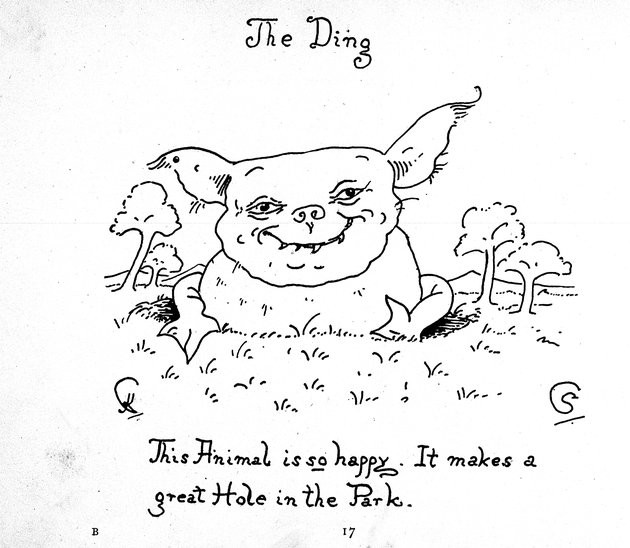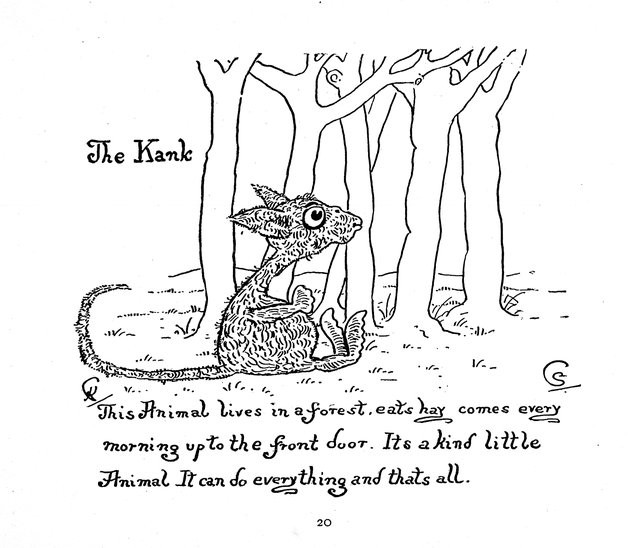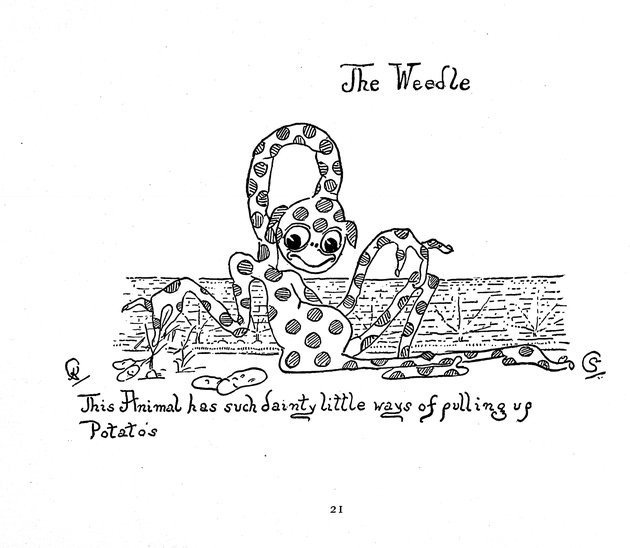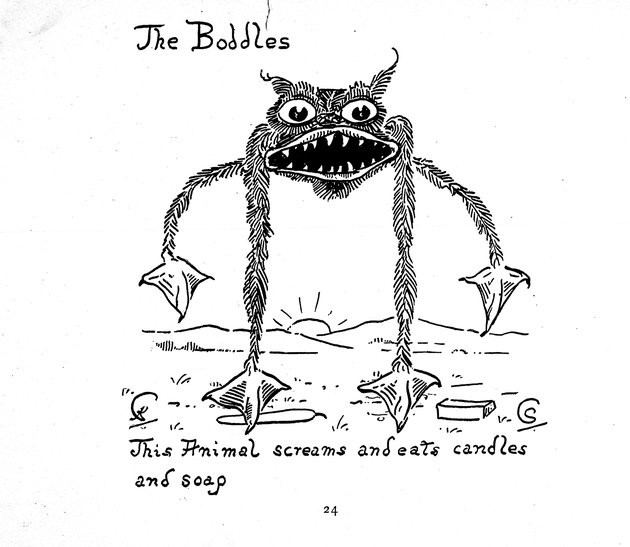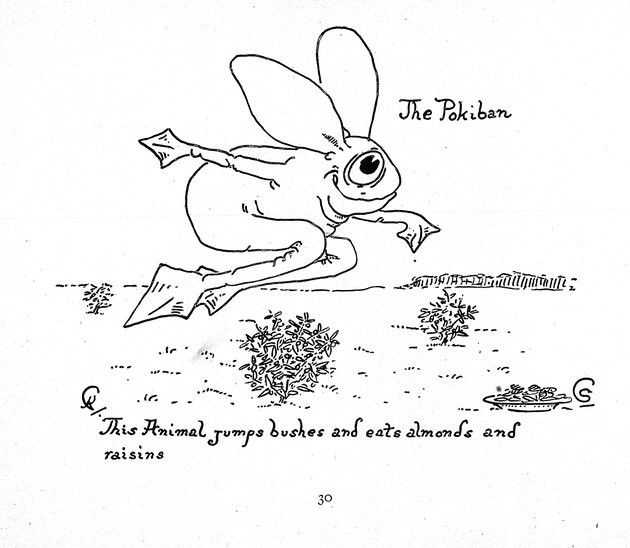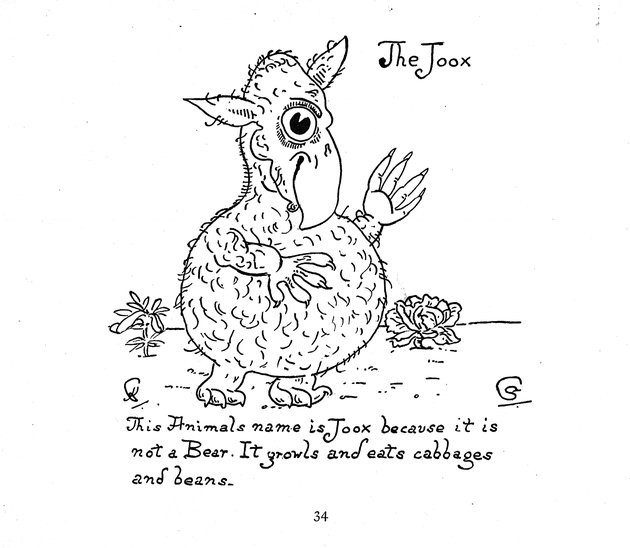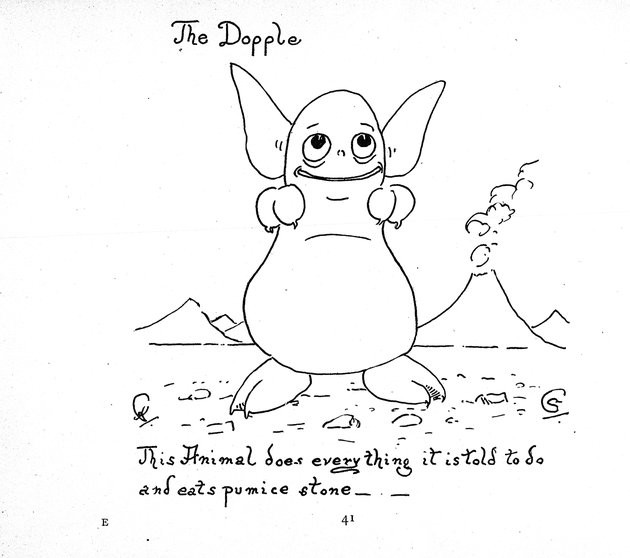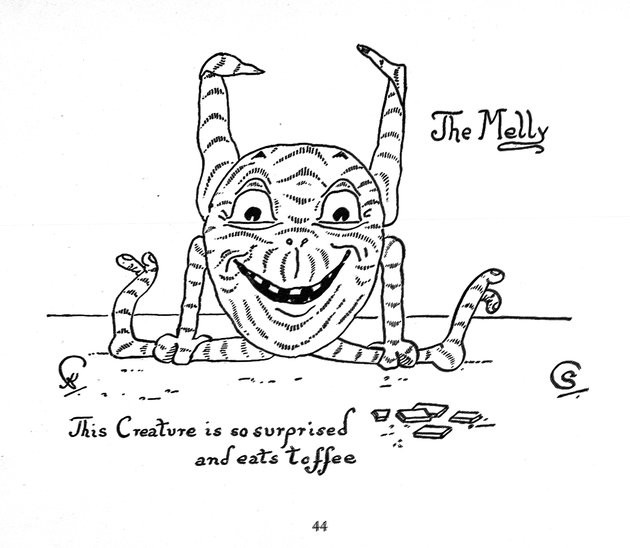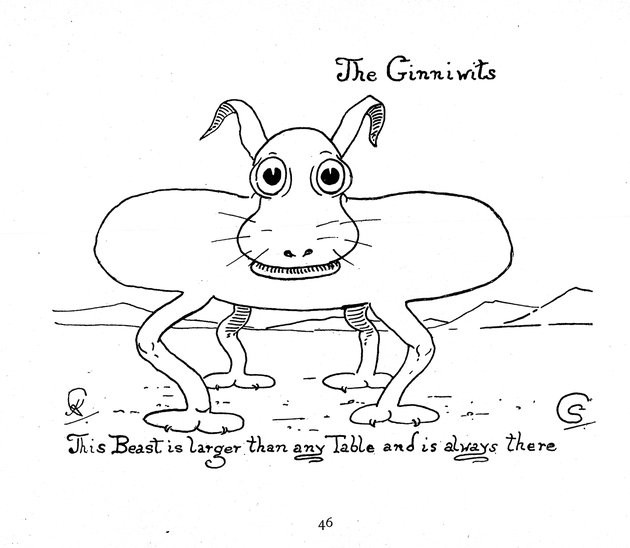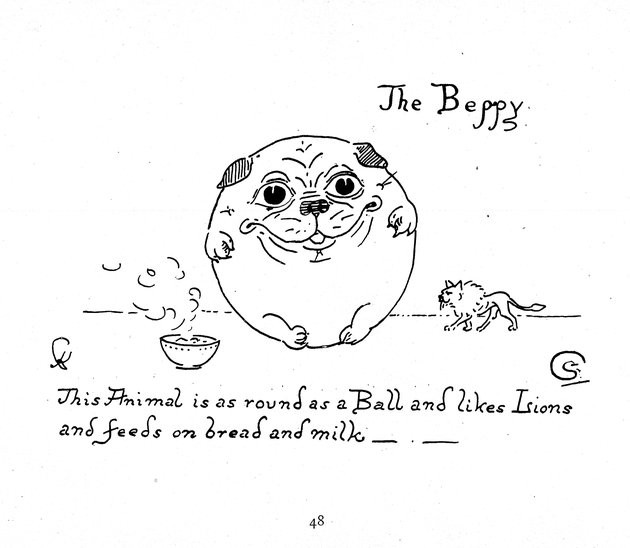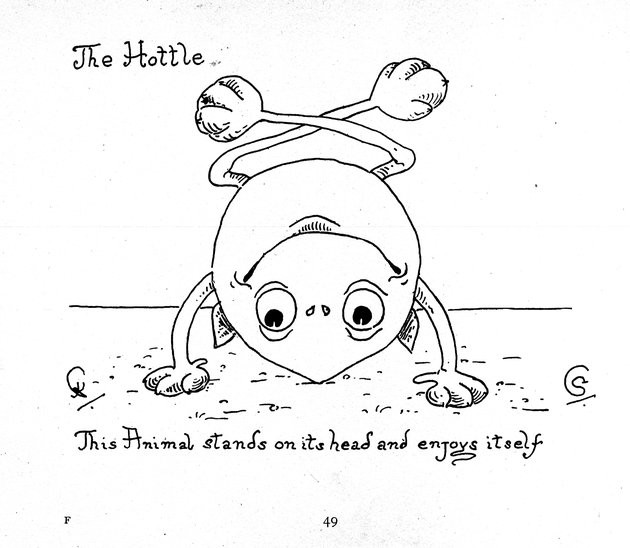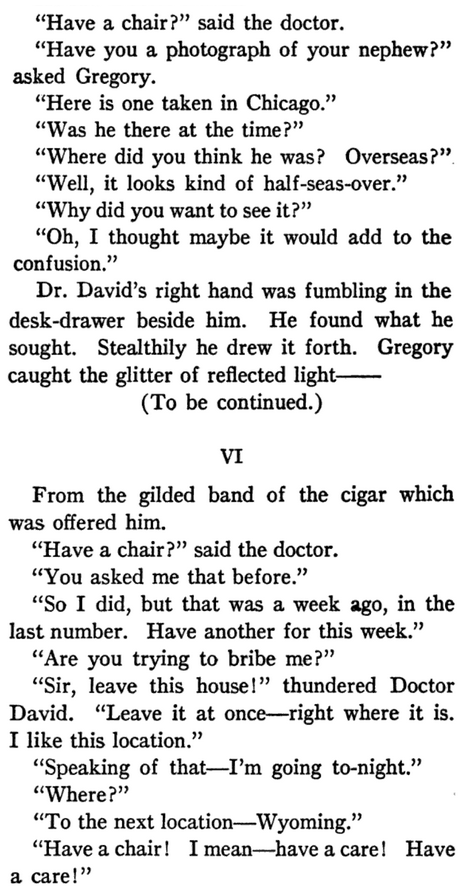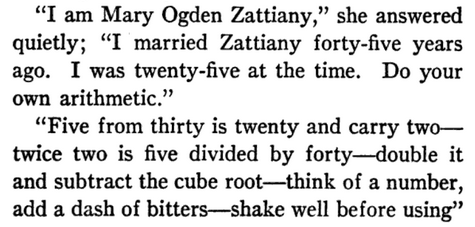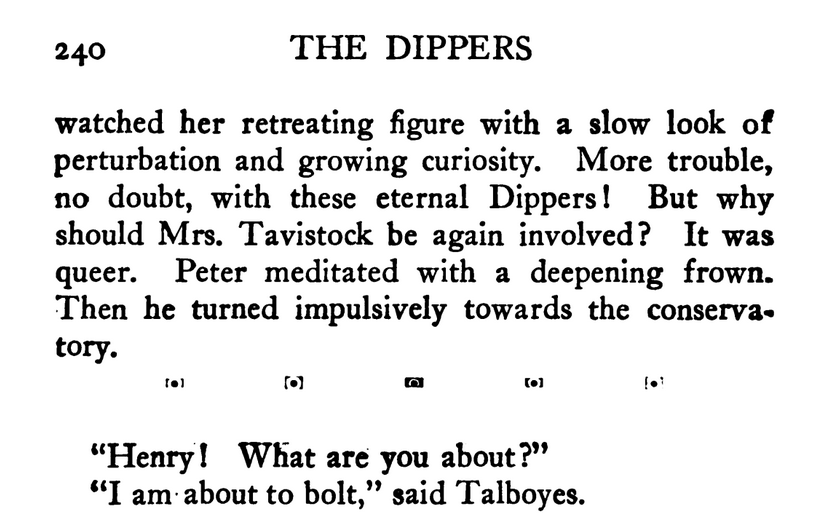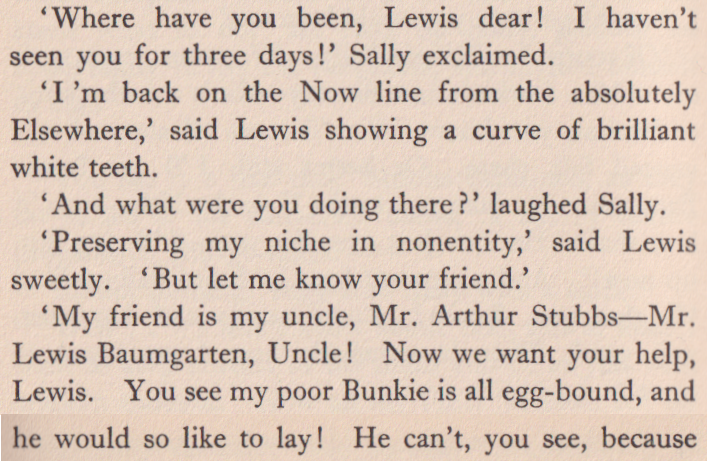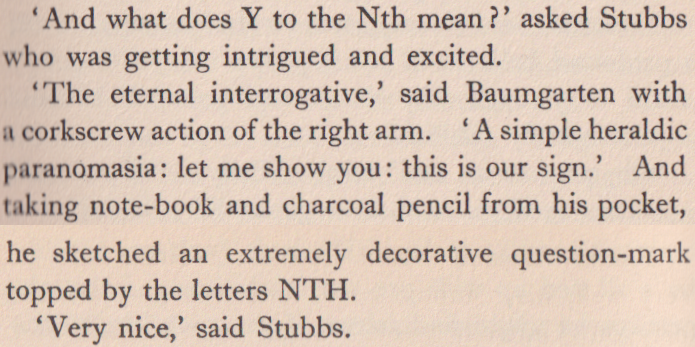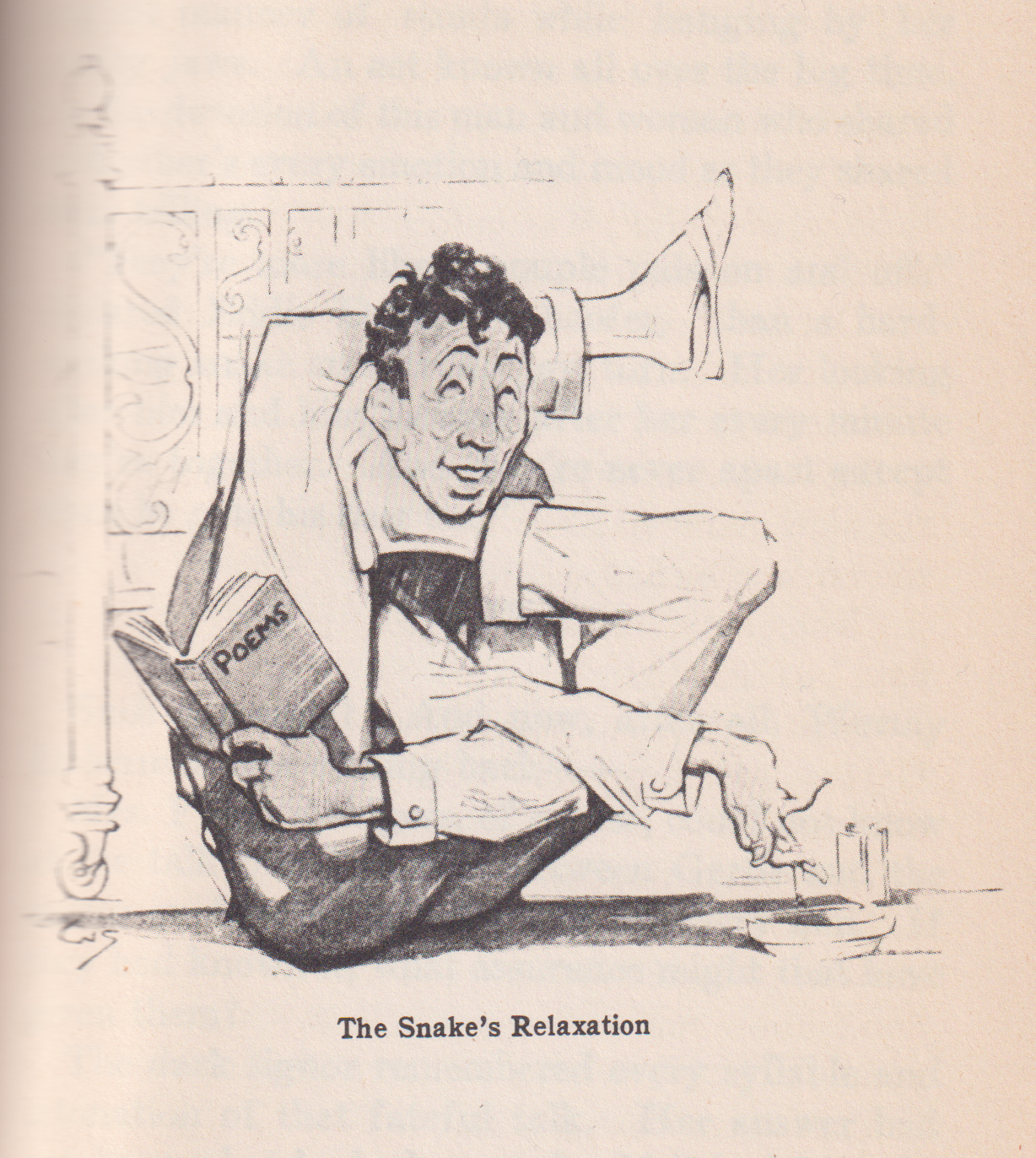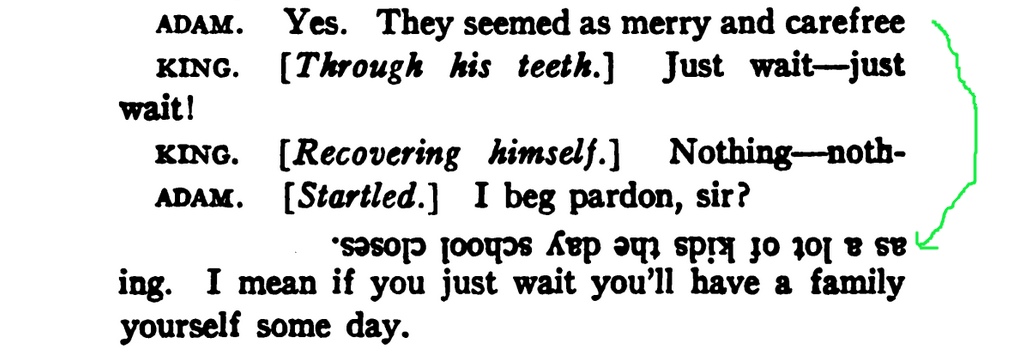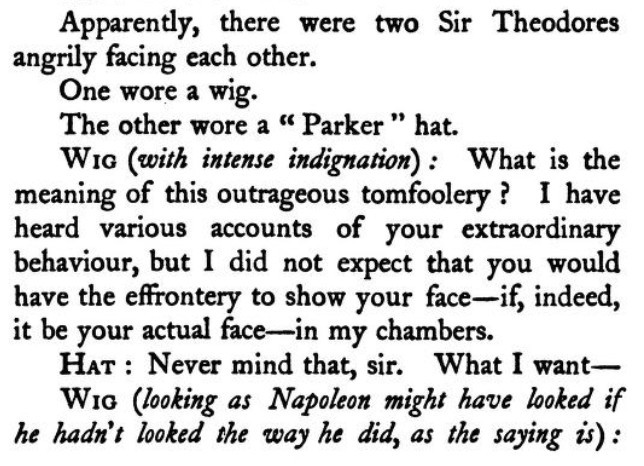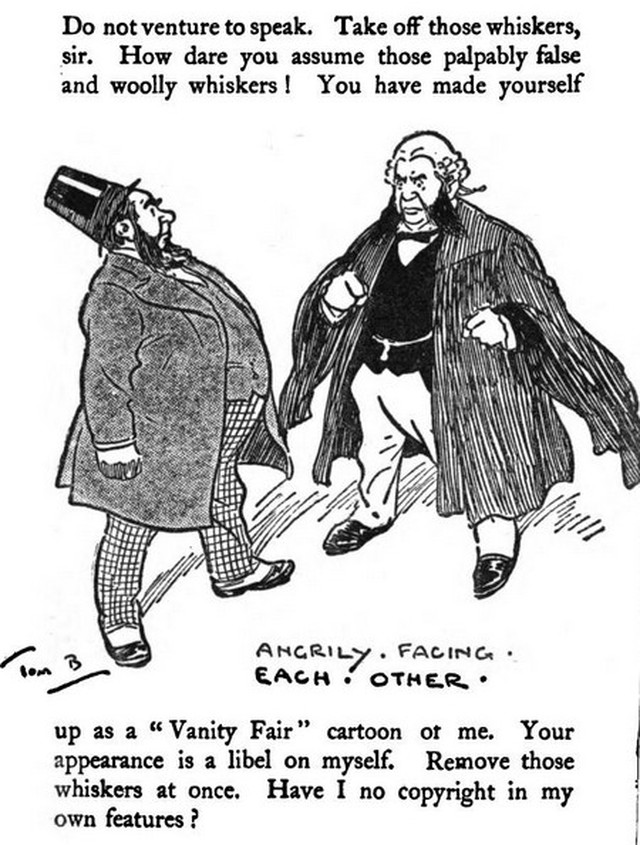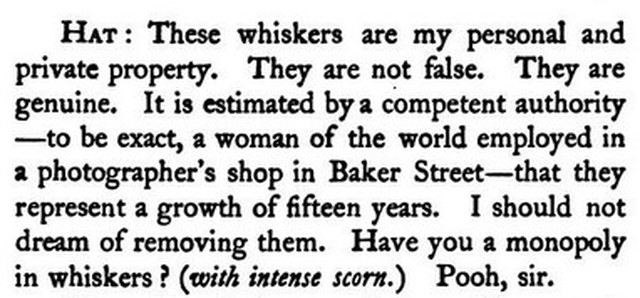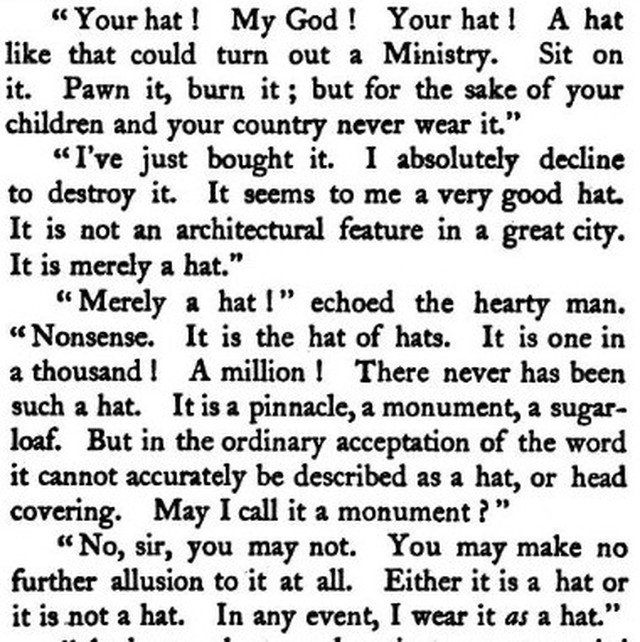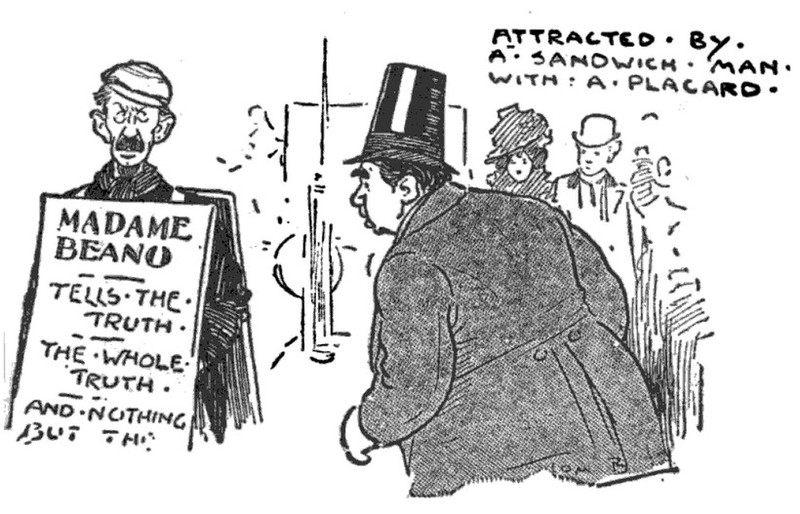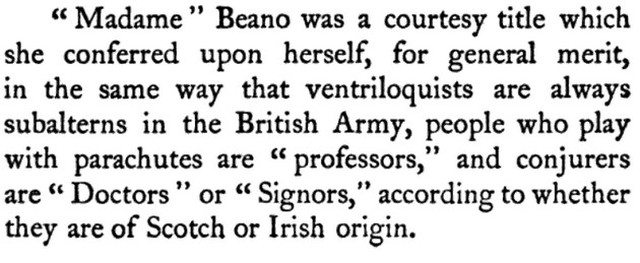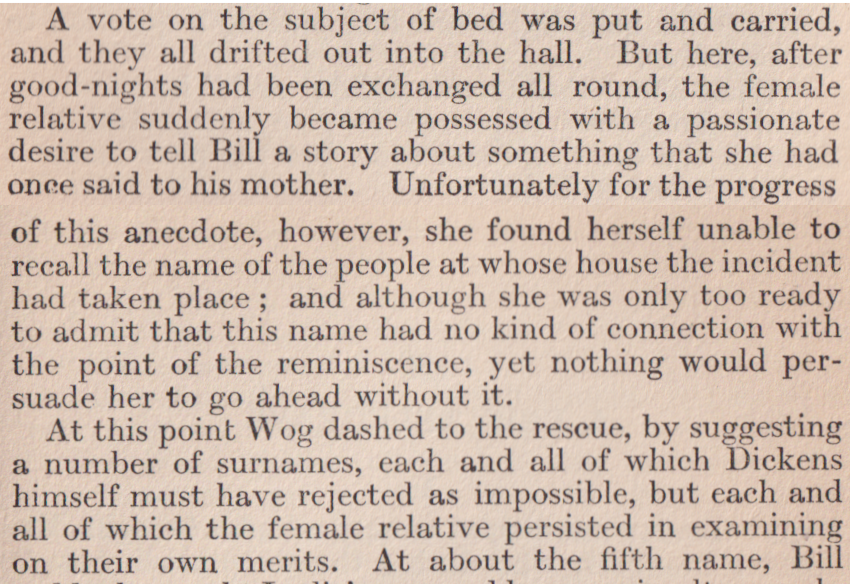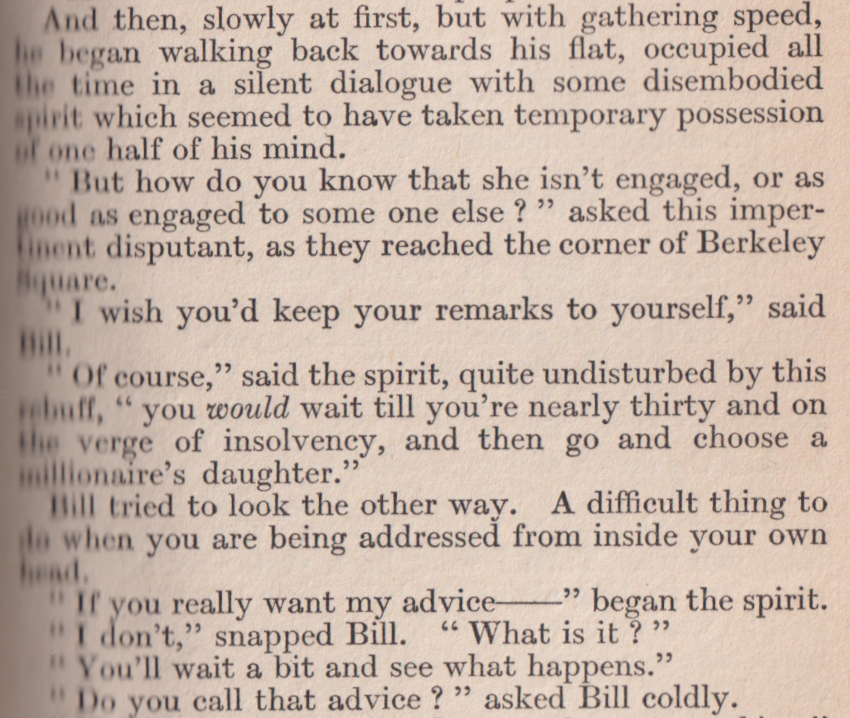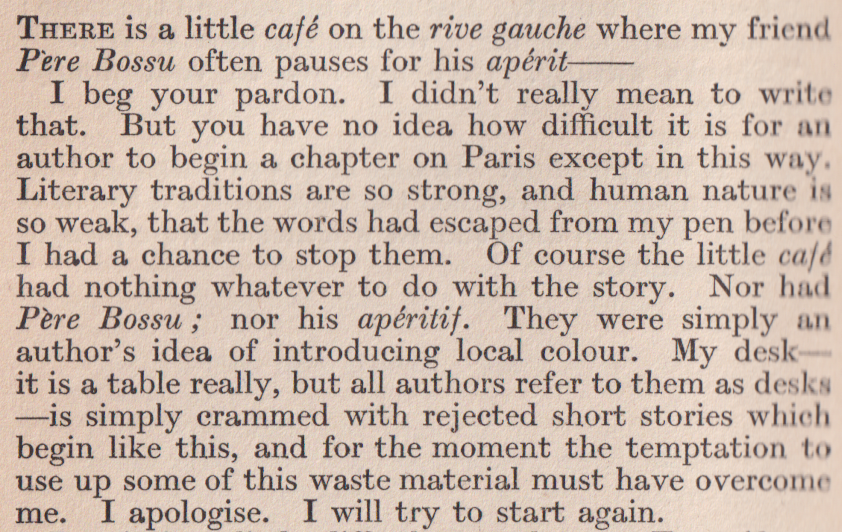|
|
 |
 |
 |
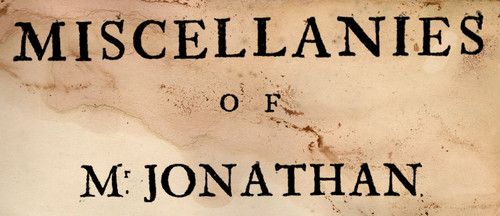
unearths some literary gems.
From Animal Land, Where There Are No People, by Sybil and Katharine Corbet:
"I have been asked to say something about the creatures that live in Animal Land where there are no People. My daughter Sybil, aged four, began to describe them to me about a year ago, but as I personally know nothing about them except that I draw them from her very graphic descriptions, I thought I had better write down a few of the facts about them, collected by her, in her own words:—'Animal Land where there are no People is quite near, only you can’t see it. It is a kind of Garden Cage, with the North Pole and the sea always roughling and wavy. In the summer they like to be hotter and hotter, and in the winter colder and colder. They live by the North Pole and in the leafy places near. It is always light there, always day, they climb the poles and always play. That is Animal Land.'"KATHARINE CORBETJanuary 1897[Some highlights include precursors to Yoda, Pikachu, and the Moog.]https://ufdc.ufl.edu/UF00086398/00001/flipbook
|



 |
|
|
 |
 |
 |

unearths some literary gems.
***[On the question of reviving archaic words.]As for "Welkin," "Lush," and "Bosky"--who dares to lead their metric feet into the prim paths of prose? Let bygones be bygones.***My words will be imaginotions, penandinkumpoops, whimpusles, mere boojums rather than classic snarks, for I shall not construct “Portmanteau” words, like Lewis Carroll.***The frequent use of the “oo” will perhaps require an apology, and the almost equally merry “aw.” The other “long” vowels, such as “ee” and “ay” and “o” seemed inadequate to my use. Of consonants, my “G” is, no doubt, most frequent. “G” supplies spuzz to a word that can hardly be obtained elsewhere in the alphabet. “K” also has a bite, but it is frequently too suggestive for our delicate susceptibilities. “L”—what could one do in such a work, without the gentle liquid that euphonizes the most savage of consonants! Also I confess having fallen in love with the anapest.***Oo´fle, n. 1. A person whose name you cannot remember. 2. A state of forgetfulness regarding a friend or thing.Oo´fle, v. 1. To try to find out a person’s name without asking. 2. To talk to an unknown person without introducing him to a nearby friend.***Tashivation. The art of answering without listening to questions.***Tin´tid-dle, n. 1. An imaginary conversation. 2. A witty retort, thought of too late, a mental postscript.***Unk. An unwelcome, inappropriate or duplicate present.***Wijjicle. A perverse household article, always out of order. [One of those recalcitrant "things"!]***Zobzib. An amiable blunderer, one displaying misguided zeal.***https://www.gutenberg.org/files/59004/59004-h/59004-h.htm
|

 |
|
|
 |
 |
 |

unearths some literary gems.
From The Dippers, by Ben Travers:
***The various appliances attached to the bath were stamped respectively with small metal tallies: "wave," "splash," "plunge," "shower," "surf," "gurge," "swash" and "tornado."[...]"Never mind," replied Mrs. Tavistock. "When I have my bath I'll try swashing for a start."***"I have sometimes seen English girls dancing quite as well in my opinion as some of the Russian prima ballerine, even those with the longest names."***"All these butlers and chauffers and footmans--feetmen--foot--"***Mr. Harry Pink was there...one of those...country gentlemen who may be counted on to do the right thing in the wrong way.***Mrs. Duckingham-Leape [of Coombe Puddy]...was...chattering with the irrelevant pertinacity of a parrot. [This is the first parrot encounter worth noting in a while!]***The twin imps of mischief and humour are always on the heels of wit, alert for a commision.***Bonuses:Moffat, Yard and CompanyMr. and Mrs. Buzzard KnowlesMiss Blanche ScollopAnd some interesting dingbats [attached].
|


 |
|
|
 |
 |
 |

unearths some literary gems.
From What Price Gloria! by Geoffrey Clayton:
***"What's an Uncle or two among friends?"***[This is Lord Wivenhurst, who is constructed more or less along the lines of Wodehouse's Lord Emsworth.]As a rule it was but a matter of seconds for him to forget, not only the name, but also the presence of anyone with whom he was supposed to be conversing.***Here it was, barely half-past ten, and yet some egg-plant was already trying to rob her of her beauty sleep.***[Among the song-pitching crowd of New York. Gloria is actually a person.]"Do either of you happen to know Miss Gloria Lee?"..."Who's it published by?"***When Kitty threw a party it stayed thrown.***"Don't take any notice of Kitty....She always gets that way in the summer."[A good all-purpose excuse for the coming season!]***"Nobody ever got anywhere by letting things slide.""Oh, I don't know, you know," said Hugh. "Think of a trombone player"...."I will not think of a trombone player!"***[Bonus: Bozeman, Bibbens, and Yoost, Inc., music publishers]
|


 |
|
|
 |
 |
 |

unearths some literary gems.
***
"Then let me give you a word of advice," said the older man, smiling so flat a smile that his clipped grey moustache stood out like a hedgehog's back.
***
Down the same steps came Beamish, a much younger man, tall and loose-limbed, in appearance rather like a hock-bottle with a fancy cork stopper.
***
"Thanks, I'd love to," said Beamish, standing like an umbrella in his long M.A. gown.
***
And here was John Beamish stalking down the road like a split niblick.
***
"I'm a convinced Freudian, and I shall expose all your horrid complexes."
"Not until after the claret," said Stubbs firmly.
***
"Well, that was simple enough!" he said aloud in great surprise, as he stuck the letter up on the bureau and looked at it as something portentous--as if he had laid an egg." [SPOILER: We are in for a LOT of unexpected egg references.]
***
Next morning he went up to school with the letter in his pocket, fingering it now and then as if afraid it was not licked up tightly enough to keep his decision in.
***
"There's a strange pleasure in doing the same thing at the same time year after year."
"Makes you feel like a heavenly body, I suppose?"
***
"He used to say to my mother: 'You know, Mrs. Egg'--Egg was my mother's married name, and I was a Miss Egg when I first met Adam...."
***
dressed in a grey flannel suit with architectural shoulders
***
"Take him to see Two Geese and a Gander by Dmitir Popoff." [Implied eggs here? And will the show lay an egg?]
***
So here he was in his own flat, quite alone except for the egg-shaped bust in steel--"Stainless Stephen" he called it to himself.
***
Stubbs began to have something of a fellow-feeling for the steel egg, almost as if he had really laid it himself.
***
Perhaps this little qualm was due to the fact that his beard was not yet one thing or the other?
***
The programme, Stubbs noted, was to consist of two parts: no fewer than thirty emotional attitudes by Mrs. Darker herself, followed after an interval for refreshments by a reading by Miss Claribel Blockhouse from her own poem-states. At the end of all, Stubbs noted the ominous word "Discussion."
***
He was not at all sure whether, without the help of the programme, he could have distinguished No. 2, "Emotions on seeing a Sunflower," from No. 8, "Meditation before Marriage"; or No. 6, "Trapped!" from No. 21, "Surprise on finding a Pearl."
***
"Could you have guessed which was Meditation before Marriage and which was Cauliflowers in Moonlight?"
***
"What a mind! What insight into the inwardness of words!"
***
If there was going to be a baby it might be wiser to put Stainless Stephen into the cupboard: you never knew what influence things had on women in that condition; and how awful to have a Stainless baby!
***
[The "object-poems" in this novel are essentially Joseph Cornell-style boxes. The first one we encounter includes--of course--a plaster-of-Paris egg; and the first of Stubbs's own object-poems includes an egg spoon. Later on, Stubbs destroys his object-poems.]
Fed by relays of object-poems the fire was now burning fiercely.
***
[The Danish housekeeper alludes to Stainless Stephen.]
"Vere is the schentlemann?....The silver schentlemann from the sitting-room?"
***
"Qui'-ow-ri', Mr. Studs, thank you."
"Stubbs. With a B. Two B's in fact."
***
Bonuses (Silly Surnames dept.):
Stockington-Poker
Miss Feathers and Miss Cynthia Feathers
the Reverend Peter Picton-Sawbridge
a family called the Upshotts
|

 |
|
|
 |
 |
 |

unearths some literary gems.
***
Enid called Eddie a mere barbarous mechanism and he took it pretty hard.
***
He didn't say anything; he just gave sort of a cough. That is, it was more like a muffled bark--as if he was afraid if he let himself out in a good hearty cough he might commit himself to something.
***
The worst thing in the lot, I thought--even worse than a glass hen sitting on glass eggs in a glass basket--was a great big china dog. He was lying down on kind of an oval plate, and too sizable for a mantelpiece ornament--he was kind of spanielish; but you couldn't tell what kind of a dog he was, unless being a china dog made him some kind of a dog. He had four awful-looking yellowish spots on him; but for the rest of him he was glistening bald all over, and the expression on what was intended to be his face honestly made me sort of sick. As a matter of fact, this dog was one of those things you don't want to look at but you can't help doing it. I'd look at him a while; then I'd walk away and try to forget about him; then I'd have to come back to see if he really did look as horrible as I thought he did, and then I'd just stand staring at him and swallowing.
"Isn't he wonderful?" Enid asked me.
[I'm tempted to say this one-ups Tom Travers's cow creamer--but it actually predates that particular Jeeves & Bertie novel by a couple of years.]
***
"It's got cubbyhole legs and duck feet," she said. Anyhow she said something like that; I'm pretty sure it was duck feet.
[Btw, I encountered this passage while we were vacationing with my family, shortly after we'd been talking about the word "cubbyhole" (as one does). And a bit of quick research suggests that "cubbyhole legs" are not, indeed, really a thing in antique furniture, but just something silly sounding that Tarkington made up.]
***
Usually she became a little snappish if we didn't agree with her; but how can you agree with a person when you don't know what she's talking about?
***
I was afraid she'd get nervous with me if I asked her why she'd paid three dollars and a half for "Biljor," especially as the author'd been too economical with capital letters and punctuation, I thought, to warrant any such outlay.
***
"Do you feel with Raffeeny?" Enid asked this young Carlos Prang.
"Beyond anything," he told her. "Raffeeny is inevitable. You feel inevitableness with him. It's elemental inevitableness."
***
I pointed to what seemed to be the picture of a pretty unpleasant chair with the perspective reversed. "For instance, that chair over there--if that's what it is--represents not a chair but the reaction of my nervous system to a chair? Is that it?"
She looked annoyed. "In a way, yes."
"Well, in what way?" I asked her. "Because I don't feel like that about a chair, at all. I haven't got any such nervous reaction to one, and if the person who painted it feels that way about chairs I don't feel as if I'd have any congeniality with him. I wouldn't even like him."
***
It wasn't that I expected to miss him exactly or be homesick for him, as you might say; but still a person can't break all that furniture and bric-à-brac for you to pay for and then just disappear out of your life without leaving kind of a queer emptiness somewhere behind him.
***
The noise going on inside [a club billiard room that's been invaded by rebelliously rambunctious children] was something that can't be expressed.
***
"Wait till we get our glasses filled and then tell us what you were going to say and we'll enjoy your remarks infinitively more [yes, that's "infinitively"!] and everything'll be simply delicious!"
***
Mr. Blodgett and Mr. Carmichael came out, dancing together and yet you might say not together, too, because they were holding on to each other but dancing different dances.
***
[I love how the metonymy here blossoms into all-out anthropomorphization. "The beach" refers to the local "society," i.e., the summer families who assemble daily at oceanside to gossip and be seen.]
The beach had got its own impressions so fixed in its mind that it might as well have had cotton in its ears.
***
"And now you come to me--you who--"
Well, that's all I stayed to hear; when any of my family begin to you-who at me, I generally do go.
***
He simply could not understand my not having perceived results that any schoolboy and so forth.
***
We went into Enid's room and looked at the frame she'd bought for his photograph....Enid had paid seventy dollars for that frame...and if you could forget what was in it nothing could have been more beautiful.
***
[Bonus: Dr. A. S. Folstner Gilmerding]
|



 |
|
|
 |
 |
 |

unearths some literary gems.
From Bateman and I in Filmland, by Dudley Clark (illustrated by H. M. Bateman):
[The conceit here is a primer or tourist guide about how the inhabitants of "Filmland"--i.e., life as it's shown in the (silent) movies--behave. The observations are all pretty obvious (and I imagine were already so in the year of publication, 1926), but sometimes they made me smile despite that.]
***
Everybody drinks champagne--gallons of it. Society Filmlanders have not much time to spare for eating. They just toss off a few goblets of champagne, look at their watches, and walk or slouch or slink or stagger away. They settle their bills with a sheaf of notes and never expect any change.
***
[The Filmlander] is not content that his face, however picturesque, should be purely ornamental; he expects it to work for its living, and to work hard. So addicted, in fact, is he to facial intercourse that when circumstances compel him to use the telephone he wastes quite a lot of fine silent emotion upon the unresponsive transmitter.
***
It is not that Filmlanders dislike books; on the contrary, they take them up and put them down quite a lot....
In the Filmland home the library is dedicated to domestic quarrels, murders, and startling revelations by the family solicitor. There is no literary use for the place. The most a Filmlander cares to read at a sitting is about a quarter of a newspaper column consisting almost entirely of headlines.
***
No one knows until the bell rings whether the favourite will be running, or, if running, who will ride him.
The Filmland race-horse is neither surprised nor discomposed when at the last moment his jockey is found to be missing. He knows that in thirty seconds or so the owner's daughter, or fiancée, who is clasping her hands in the front row of the grand stand, will have changed her clothes [and] leapt on his back....
***
In Filmland they do not go in for any little wispy bits of moon that look like a slice of melon. The Filmland moon, when it shines, shines all over, irrespective of anything the calendar may have to say about it.
"Don't talk to me about 'phases' and 'partial eclipses,'" says the Filmland moon...."Look at all those people down there making love and so on. What's the use of their trying to be picturesque and working their faces about if I don't give 'em a decent light to do it by?"
***
The Filmlander knows, or should know by this time, exactly what sort of weather he is going to get according to what he intends doing when he goes out.
***
It is wonderful the way in which Filmlanders will master the contents of a long letter simply by tearing it open, glancing at it, and crushing it convulsively in their hands.
[....]
Sometimes they are rather careless in the way they leave them lying about. A tremendous amount of trouble is caused in Filmland by letters and dispatches being read by people other than those for whom they are intended.
***
|


 |
|
|
 |
 |
 |

unearths some literary gems.
***I glanced across the table at a young Englishwoman....To sum her up in a general way, she looked as if she did not write poetry.***I had deliberately concluded I would do no sightseeing. Not that I objected to seeing a sight, now and then, but the sight would have to put itself in my way, and the conditions would have to be such that I should prefer to go through the sight rather than around it.Indeed, it was largely the word sightseeing that I took exception to. Such a very defective verb! Who would voluntarily put herself in a position to say, “I sightsaw the National Gallery yesterday,” or “I have sightseen the whole City,” and then have no proper parts of speech to say it with?[...]And yet, I wanted to go to the Tower, the Bank, and the Charter-house. I wanted to go to Westminster Abbey and Saint Paul’s and the National Gallery. But I did not want to go for the first time. I wanted to revisit these places, and how could I do that when I had never yet visited them?***Apparently, whoever was in charge had simply provided all there was in the world of everything; and a guest had merely to mention a preference for anything edible, and it was immediately served to him.The Londoners of course, being quite unaware what they wanted to eat, vaguely suggested one thing or another at random; and the vague waiters, apparently knowing the game, brought them something quite different. These viands the Londoners consumed with satisfaction; but in what was unmistakably a crass ignorance of what they were eating.All this fascinated me so that I greatly desired to try experiments, such as sprinkling their food thickly with red pepper or putting sugar in their wine. I have not the slightest doubt that they would have calmly continued their repast, without the slightest suspicion of anything wrong.***The dining-room was another revelation. One corner was occupied by a huge, high-backed angle-shaped seat of carved wood, which carried with it the atmosphere of a ruined cathedral or a Hofbrauhaus.***Huge gold earrings and strings of clinking beads were worn with a confection of bright-colored satin and cotton lace, which would have been conspicuous in the front row of a comic opera chorus.***I had hoped that our route might cause us to pass through Upper Tooting, as, next to Stratford, this was to me the most interesting name in my little red book. I know not why, but Upper Tooting has always possessed for me a strange fascination and, though it sounds merely like the high notes of a French horn, yet my intuition tells me that it is full of deep and absorbing interest.***As we had neither of us ever been in Stratford before, we left the train at the station and paced the little town with an anticipation that was like a blank page, to be written on by whatever might happen next.***We agreed that as the path across the field had been here ever since Shakespeare trod it, and as it would in all probability remain for some time in the future, the mere coincidence that we were traversing it at this particular moment was nothing to be thrilled about.***Meeting friends at a London station is always exciting. To begin with, they are never there.***“It is absurd for one to be such a slave to one’s luggage. Somebody ought to invent a trunk with legs and intelligence, that would run after us,—instead of our running after it!”[Cf. JC-E: “Why can’t furniture just move itself?” Sippy would say. “I mean, these pieces all have legs, right? I think that anything that calls itself a ‘dresser’ ought to be able to get dressed and out of the house without my help.”]***A friend of mine who lives in Chelsea proudly assured me that he could throw a stone from his garden into Carlyle’s! The point of his remark seemed to be not his superior marksmanship, but the proximity to the garden of a great man. Now, were I of the stone-throwing sex, there is many a dead hero at whose garden I should aim before I turned toward Carlyle’s. But of course this was because my friend lived in Chelsea. Therefore the non-resident, not being confined to a locality, can throw imaginary stones into any one’s garden.***While we were doing Early Restaurants Miss Anna said, “We must take in Crosby Place.”This pleased me hugely, for I remembered how Gloucester, in Richard the Third was everlastingly repairing to Crosby Place, and I desired to know what was the attraction.I found it interesting, but, lacking Gloucester, I shall not repair there often. To be sure, it is a magnificent house, Gothic, Perpendicular, and all that; the hangings and appointments are, probably, much as they used to be, but after all, I do not care greatly for eating among Emotions.***And yet, after all, my heart goes back with fondest memories to Euston. Not the crowd, not even the atmosphere, but a mysterious influence which emanates from those wonderful columns. Not only the sight of them as you approach from London, but the queer, almost uncanny way in which they permeate the whole place. They follow you through the station and into the train, and not for many miles can you get out from under the presence of those perfect shapes.***All was usual and orthodox. Everybody listened politely to everybody’s else chatter, and, apparently unhearing, answered at random, and quite often wrongly.****The headgear of these same ladies can be called nothing less than alarming. [That line is the basis for one of the illustrations, too.]During the summer of which I write, it was the whim to wear huge shapes of the mushroom or butter-bowl variety. These shapes, instead of being decorated with flowers or feathers, bore skilfully contrived fruits, that looked so like real ones I was often tempted to pluck them. Cherries and grapes were not so entirely novel, but peaches, pears, and in one instance a banana, seemed, at least, mildly ludicrous. I was rejoiced to learn that these fruits, being stuffed with cotton-wool, were not so weighty as they appeared; but they were indeed bulky, and crowded on to the hat in such quantities that it seemed more sensible to turn the butter-bowl the other side up to hold them.***The first humorous story I heard in London was of the man who, returning from a festal function, inquired of the policeman, “Is this Piccadilly Circus, or is it Tuesday?” That story seems to me the epitome of London humor, and also a complete description of Piccadilly Circus.***[Also illustrated, and notable mostly because teddy bears had only been around for about 5 years when this book was published.]I recently saw in one of our finest Fifth Avenue restaurants a most attractive young woman, who came in accompanied by a well-set-up, and moreover an exceedingly sensible looking, young man.With absolute savoir faire, and no trace of self-consciousness, the girl carried in her arm a large brown “Teddy bear.”The couple sat at a table and ordered some luncheon, and the bear was also given a seat, a napkin was tucked about his neck, and a plate placed before him. The girl’s face was sweet and refined; the man’s face was intelligent and dignified, and the bear’s face was coy and alluring. There was no attempt to attract attention, and, luncheon over, the young woman, who was at least twenty years old, tucked her pet under her arm, and they walked calmly out.***With a farewell nod to the northeast lion (which is my favorite of the four), I would jump into a hansom and jog over to the British Museum.[These are the Trafalgar Square lions. Of course one has to have a favorite!]***As I bounced happily along, I would note many landmarks of historic interest. Some of these were real, and others made up by myself on the spur of the moment, to fit a passing thought.***“I was found dead in my bed this morning.” [Check out the illustration!]***But to return to my going ons (which must by no means be confounded with goings-on). ["Going ons" refers to when a party guest is "going on" to another party.]***The disposition of the emptied hamper [which had contained a "put-up luncheon" for a train ride] was simply to restore it to its place under the seat, and leave it there. Apparently it had the instincts of a homing pigeon.***Leaving Dover was like backing away from a picture post-card.***The French capital is paved with cabs, and of such a cheapness of fare that I soon discovered it was more economical to stay in them than to get out.***With what I fancied a French shrug of my shoulders, I mispronounced a French phrase of acquiescence, and declared myself ready to go.***The “Cabaret du Neant” is supposed to be a fearsome place, where guests sit around coffins and see ghosts. But so like substantial tables were the coffins, and so sociable and human the ghosts, that awe gave place to amusement.***[Re. the Mona Lisa]By a queer correlation of ideas, my mind reverted to the Laughing Cavalier, and I wondered if these two were smiling at the same thought.***[Bonus 1: "flapping frilliness"][Bonus 2: Wells quotes from this poem, which is new to me and made me smile: https://www.bartleby.com/270/1/276.html ]
|

 |
|
|
 |
 |
 |

unearths some literary gems.
From The Emily Emmins Papers, by Carolyn Wells:
***
And so, as I, Emily Emmins, spinster, have the full courage of my own convictions, I found myself one crisp April morning walking happily along the lower portion of Broadway. Impulse urged me on toward the Battery, but, as often happens, my impulse was side-tracked. And all because of a woman’s smiling face. I was passing the offices of the various steamship companies, and I saw, coming down the steps of one of them, a young woman whose countenance was positively glorified with joy. I couldn’t resist a second glance at her, and I saw that both her hands were filled with circulars and booklets.
It required no clairvoyance to understand the situation; she had just bought her first ticket to Europe, and it was the glorious achievement of a lifelong desire. I knew, as well as if she had told me, how she had planned and economized for it, and probably studied all sorts of text-books that she might properly enjoy her trip, and make it an education as well as a pleasure. And as I looked at the gay-colored pamphlets she clutched, I was moved to go in and acquire a few for myself.
With Emily Emmins, to incline is to proceed; so I stepped blithely into the big light office and requested booklets. They were bestowed on me in large numbers, the affable clerk was most polite, and,—well, I’m sure I don’t know how it happened, but the first thing I knew I was paying a deposit on my return ticket to Liverpool.
I may as well confess, at the outset, that I am of a chameleonic nature. I not only take color from my surroundings, but reflect manners and customs as accurately and easily as a mirror. And so, in that great, business-like office, with its maps and charts and time-tables and steamer plans, the only possible thing to do seemed to be to buy my ticket, and I did so.
***
Another letter left me hesitating as to whether my proposed journey was advisable after all. This letter was from the Elsinore Travel Bureau, and explained how, by the purchase of a new-fangled stereoscope and innumerable sets of “views,” one could get far more satisfaction out of a European trip by staying at home than by going abroad. “So real are the scenes,” the circular assured me, “that one involuntarily stretches out a hand to grasp what isn’t there.” Surely, realism need go no farther than that; yet some over-exacting people might demand that the grasped-for thing should be there.
***
But, being amiable, I smiled pleasantly on all, agreed with each adviser, and held my peace. For, to me, preliminaries mattered little, and I knew that as soon as I was fairly at sea, or at least beyond the three-mile limit, I could make my own plans, and carry them out without let or hindrance.
***
The only points that seemed to be impressed on my mind were that, in London parlance, “Thank you” invariably means either “Yes” or “No” (nobody seemed quite sure which), and that in England one must always call a telephone a lift.
***
Suddenly it occurred to me that I was receiving “first impressions.” How I hated the term! Every one I knew, who had ever crossed the ocean before I did, had said to me, “And you’ve never been over before? Oh, how I envy you your first impressions!”
As I realized that about seventy-nine people were even then consumed with a burning envy of these first impressions of mine, I somehow felt it incumbent upon me to justify their attitude by achieving the most intensely enviable impressions extant.
***
[I recommend the illustration called "Portrait of Jane Sterling" (which the text in proximity to it will explain).]
***
Although beatifically serene and abnormally good-natured, I felt an utter aversion to exertion of any kind, mental, moral, or physical. Even the thought of studying my fellow-travellers seemed a task too arduous to contemplate.
And so I sat there all the morning and not a fellow-traveller was studied.
“This won’t do,” I said to myself, severely, after luncheon. “Here you are, not a hint of sea-sickness, the day is perfect, you know how to adjust your rug, and all conditions are favorable. You must study your fellow-travellers.”
But the afternoon showed little improvement on the morning. As a result of desperate effort, I scrutinized one lady and decided to call her the Lady with the Green Bag.
It wasn’t a very clever characterization, but it was, at least, founded on fact.
Another I conscientiously contemplated, and finally dubbed her the Lady Who Isn’t an Actress. This was rather a negative description, but I based it on the neatness of her vanity-bag and the carelessness of her belt, and I am sure it was true.
***
“Now listen, Miss Emmins. I think you’re delightful, and I’m going to help you all I can by not advising you.
***
But the word green, as we say it in our haste, is utterly inadequate to apply to the color of the English landscape. Though of varying shades, it is always green to the nth power; it is a saturated solution of green; it is a green that sinks into the eye with a sensation of indelibility.
***
She described the home he had just built for her in Chicago, and it seemed to be a sort of Liberal Arts Building set in the last scene of a comic opera.
***
“What London do you want to use?” asked Mr. Travers, interestedly. “You know there are many Londons for the entertainment of visitors. We can give you the Baedeker London, or Dickens’s London, or Stevenson’s London, or Bernard Shaw’s London, or Whistler’s London——”
“Or our own W. D. Howells’s London,” I finished, as he paused in his catalogue.
“I think,” I went on, “the London I want is a composite affair, and I shall compile it as I go along. You know Browning says ‘The world is made for each of us,’ and so I think there’s a London made for each of us, and we have only to pick it out from among the myriad others.”
“That’s quite true,” said Mrs. Travers. “You’ll be using, do you see, many bits of those Londons mentioned, but combining them in such a way as to make an individual London all your own.”
The prospect delighted me, and I mentally resolved to build up such a London as never was on land or sea.
***
“What waggery!” observed Mrs. Travers, in a calm, unamused tone, and I suddenly realized that I was in the midst of an English sense of humor.
***
We discussed the English tendency to elide letters or syllables from their proper names, falling back on the time-worn example of the American who complained that Englishmen spell a name B-e-a-u-c-h-a-m-p and pronounce it Chumley.
“But it’s better for an American,” said Mr. Travers, “to pronounce a name as it is spelled than to elide at his own sweet will. I met a Chicagoan last summer, who said he intended to run out to Win’c’s’le.”
“What did he mean?” I asked, in my ignorance.
“Windsor Castle,” replied Mr. Travers, gravely.
***
In all my life, my waking hours had never reached three o’clock A.M., from either direction, and when, on the first morning after my arrival in London, I was awakened at that hour by a gently intrusive daybreak, I felt as if I had received a personal and intentional affront.
***
At about seven o’clock the omnibuses began to ply. I had never known before what was indicated by the verb to ply. But I saw at once that it is the only word that properly expresses the peculiar gait of an omnibus, which is a cross between a rolling lurch and a lumbering wobble. Fascination is a mild term for the effect these things had on me.
One omnibus might not so enthrall me. I don’t know; I have never seen one omnibus alone. But the procession of them along Piccadilly is the one thing on earth of which I cannot conceive myself becoming tired.
Their color, form, motion, and sound all partake of the primeval, and their continuity of effect is eternal.
My Baedeker tells me that the first omnibuses plying in London were “much heavier and clumsier than those now in use.” But of course this is a mistake, for they couldn’t have been.
I have heard that tucked away among the gay-colored advertisements that are patchworked all over these moving Mammoth Caves are small and neatly-lettered signs designating destinations. I do not know this. I have never been able to find them. But it doesn’t matter. To get to Hampstead Heath, you take a Bovril; to go to the City, take Carter’s Ink; and to get anywhere in a hurry, jump on a Horlick’s Malted Milk.
[...]
I always feared that, if I got in or on one, I couldn’t see the rest of them as a whole. And it is the unbroken continuity that, after the coloring, is their greatest charm.
[later]
The ocean may be wider,—the Flatiron Building may be taller,—but there’s nothing in all the world so big as a London omnibus.
[Cf. Jeremy Edwards:
Over Millicent’s shoulder, a stream of taxis—apparently perpetual while the green lights reigned—evoked the infinite scope of the city.
She followed my gaze. “Have you ever imagined that as soon as they disappear beyond the horizon, they dip under the island and loop back around? It could be the same fifty taxis, over and over.”]
***
And as I trod, I suddenly found myself in Curzon Street. This was a pleasant sensation, for did I not well know the name of Curzon Street from all the English novels I had ever read? Moreover, I knew that in one of its houses Lord Beaconsfield died, and in another the Duke of Marlborough lived. The detail of knowing which house was which possessed no interest for me.
[...]
Attracted by the name of Half-Moon Street, I left Curzon Street for it. Shelley once lived in this street, and I selected three houses any one of which might have been his home.
***
Though I expected to shop in London, there was only one article that I was really anxious to buy. This was a jade cube. For many years I had longed for a jade cube, and American experts had contented themselves with stating there was no such thing in existence. Time after time, I had begged friends who were going to the ends of the earth to bring me back a jade cube from one of the ends, but none had accomplished my errand.
***
An English telephone is a contradiction in terms. If it is in England, it isn’t a telephone. It is a thing that looks something like a broken ox-yoke, that is manipulated something like a trombone, and is about as effectual as the Keeley Motor.
A course of lessons is necessary to learn to use one, but the lessons are wasted, as the instrument is invariably out of order, and moreover, nobody has one, anyhow.
But one morning, before I had discovered all this, I was summoned to the telephone booth of the Pantheon Club, and blithely grasped the cumbersome affair, with its receiver on one end and its transmitter on the other. I ignorantly held it wrong end to, but that made no difference, as it wouldn’t work either way.
[Illustration recommendation: “Grawsp it stiffer, M’am.” Ooh-er! I like to imagine the author and illustrator did this knowingly, and I think it's quite possible, all things considered.]
***
I had not intended to plunge into the social whirl so soon, and had declined all the many invitations which had come to me by mail.
But somehow the telephone invitation took me unawares, and, too, I was so pleased to succeed in getting the message at all that it seemed ungracious and ungrateful to refuse.
***
The London hostess’s invariable mode of procedure is a sudden, inordinate gush of welcome, followed immediately by an icy stare. By the time you have politely responded to the welcome, your hostess has forgotten your existence. Nay, more, she seems almost to have forgotten her own. She is vague, self-absorbed, and quite oblivious of your existence. I have heard of a lady with a gracious presence. The London hostess is best described by a gracious absence.
But having adapted yourself to this condition, your hostess is likely to whirl about and dart a remark or a question at you.
***
“A well-bred Englishwoman,” my hostess dictatorially observed, “never talks of herself. She tactfully makes the person to whom she is talking the subject of conversation.”
“But,” said I, “if the person to whom she is talking is also well-bred, he must reject that subject, and tactfully talk about the first speaker. This must bring about a deadlock.”
***
Moreover, at English afternoon teas there are two rules. One is you may not speak to a fellow-guest without an introduction. The other is that no introduction is necessary between guests of the house. One of these rules is always inflexibly enforced at every tea; but the casual guest never knows which one, and so complications ensue.
|


 |
|
|
 |
 |
 |

unearths some literary gems.
From Polly Preferred, by Guy Bolton:
***
Even her favorite invocation hadn't helped; the love of Pete didn't prevent her blouse from being stained.
***
"I seen you had the genius of a Sarah Bernhardt the first time I set me penetratin' orbs on you, and I've never had to change spectacles since."
***
"Maybe if I try a new sandwich I can make a fresh start."
***
She stood all unconscious, studying the sandwiches as profoundly as if they had been examples in Trigonometry.
***
Raising an imaginary monocle to her eye, [she] looked him over.
***
Moving pictures!...That magic world in which heroes heroed, in which beauties beauted....
***
"I don't know how it is, but you make nonsense turn to sense."
***
[A mashup of "asking for the moon" and "the moon is made of green cheese"]
"Oh, I wonder if I can have a cigarette?" Polly asked sweetly.
"Can you!" Let her ask for a slice of the moon's green cheese, and Joe would promptly sharpen the knife to carve it.
***
"I need the walk to keep down my embongpong."
***
[I *think* Bolton is breaking the fourth wall here.]
But he wasn't going to give up his grouch. That, at least, he might indulge in to the end of the chapter.
***
[Bonus: An employee of a busy automat restaurant ironically suggests he can ask "Mrs. Automat" (i.e., a quaint, nonexistent owner) to accommodate a customer's special request.]
|

 |
|
|
 |
 |
 |

unearths some literary gems.
[Note: This book involved so much plot development about financial turbulence and machinations within the early 1920s British import-export hosiery industry that I was almost craving a cricket match.]
***
It seems a little obvious, perhaps, to say that nothing marks the passage of time so much as one's birthdays, since it was precisely for this purpose that birthdays were first invented.
***
[This somehow ties in with pre-blogging the future and all that, as I see it. The protagonist entertains his young niece by spinning yarns of things that supposedly happened that day, until it's her bedtime.]
"That's all that happened to-day," said Bill firmly....
"But more happened another day?" suggested Sylvia.
"Oh, yes. Lots more. Only it hasn't happened yet, you see."
***
[Piling on the participles!]
What on earth, he asked himself...had he been and gone and done now?
***
Is there anything, one wonders, like the human nose for playing these tricks with one's memory. An all-but-forgotten tune can do a good deal, it is true; but for the sheer illusion which can set time at defiance, commend me to the all-but-forgotten smell.
***
"I'm quite serious," she said.
"So am I," answered Bill.
And in proof of this, they both laughed.
***
So far as it went, the interview was a satisfactory one. That is to say that neither the manager nor his assistant...laughed loudly or gave other signs of visible contempt at the idea of Messrs. Fraser and Company coming to them for a loan.
***
One of Mr. Stromberg's mannerisms...was to fill up any of the pauses which marked his search for a missing word with a kind of buzzing sound.* By this simple means he was able at the same time to prevent anyone else from breaking in on him.**
[*Coincidentally, a character in Burke's Law "Who Killed Hamlet" does something similar.]
[**Would we call this a "ploy"?]
***
The butler executed a brief fantasia on the electric switches by the door, the general effect of which was to leave the lighting pretty much as it was.
***
He sped past them both and resumed his place at the sofa, rather as though he were trying to create the illusion that he had never really left the room.
***
Couldn't we leave it to other people to wallow in italicised sentiment?
[N.B. This is the narrator speaking to the reader.]
***
George pointed out that once a Frenchwoman becomes a widow...she is practically immortal....Mme Lemaitre may have been more of a potential than an actual widow; but this is the important fact: she dressed like one.
***
Heaven knows that you and I aren't the kind of people to set ourselves up as experts on sentiment.
[Narrator to reader, again.]
***
[Sometimes one word takes a sentence from amusing to hilarious.]
"I won a prize at the tennis tournament." She illustrated this triumph by a vigorous movement with her arm, narrowly escaping hitting a passer-by in the beard [my emphasis].
***
"A Swiss half-franc for your thoughts." [I wonder how that would come out if run through the 1922 exchange rate against the British penny.]
***
There were super-dressing-cases, super-umbrellas, super-clocks, super-photograph-frames and super-articles to which it was impossible to give any name. The shop itself had clearly abandoned the attempt, and had ticketed them as "The Season's Novelties."
***
"Perhaps he'll be able to see further into this brick wall than I can."
***
[Three longer snippets attached.]
[Bonus: Section III (of seven sections total) is entitled, "A Few Telegrams." It makes me think of Mackail's buddy Wodehouse, of course; but Bill the Bachelor dates from 1922, i.e., roughly a decade prior to those telegram-heavy Jeeves and Bertie novels--though of course PGW may have used flurry-of-telegram business earlier elsewhere.]
|

 |
|
|
 |
 |
 |

unearths some literary gems.
From "Mary Smith," by Booth Tarkington:
***[Breaking the ice by talking about the weather. (And I note the inclusion of Yesterday's Weather!)]Our Henry took up the weather where she left it; he put it to its utmost; he went forward with it, prophesying weather; he went backward with it, recalling weather; he spun it out and out, while she agreed to all he said, until this overworked weather got so stringy that each obscurely felt it to be hideous. The thread broke; fragments wandered in the air for a few moments, but disappeared; a desperate propriety descended, and they fell into silence over their eggs.***She laughed a great deal. She even had a way of laughing in the middle of some of her words, and it gave them a kind of ripple....A pen cannot express it, neither can a typewriter, and no one has yet invented a way of writing with a flute.***
|

Page 27 of 64

> Older Entries...

Original Content Copyright © 2025 by Craig Conley. All rights reserved.
|




